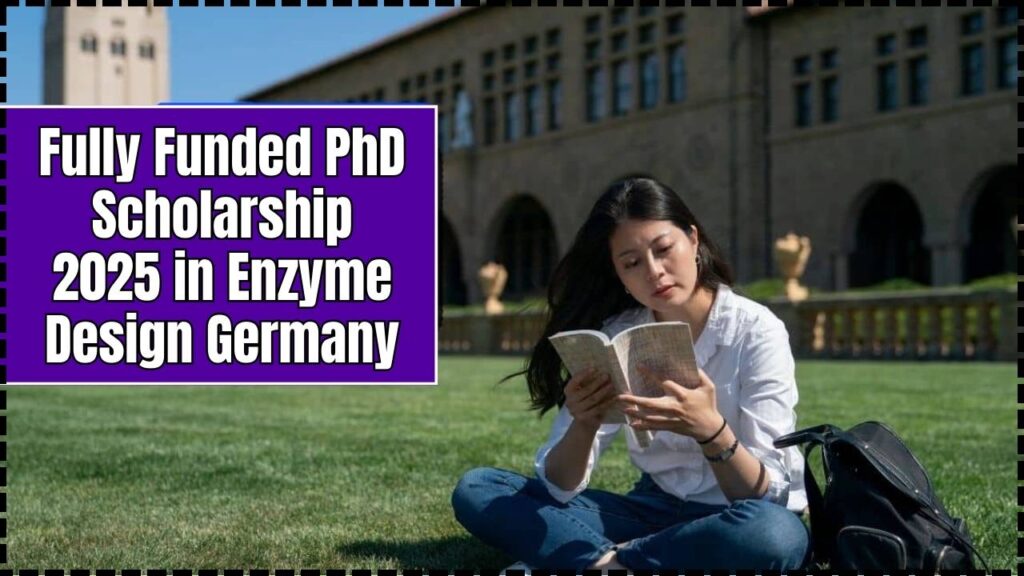Fully Funded PhD Scholarship 2025: If you’re dreaming of pursuing a fully funded PhD scholarship in enzyme design in Germany in 2025, this might be your golden opportunity. Germany is home to some of the most prestigious research institutions in the world, and its strong commitment to science, innovation, and education makes it a top destination for aspiring researchers from around the globe.

Whether you’re a recent graduate in biochemistry, computational biology, structural biology, or machine learning—or simply passionate about exploring how enzymes function at the molecular level—Germany offers unique PhD programs that blend theoretical insight with experimental science. These programs enable you to contribute to cutting-edge discoveries, earn a comfortable living stipend, network with global experts, and gain access to world-class laboratories and facilities.
Fully Funded PhD Scholarship 2025
| Aspect | Details |
|---|---|
| Field | Enzyme Design, Computational Biology, Machine Learning, Biochemistry, Molecular Biology |
| Program Type | Fully Funded PhD Scholarships |
| Available At | IPB Halle, TU Darmstadt (DAAD GSSP), Max Planck (IMPRS-ML), and other top institutions |
| Eligibility | Master’s degree in a relevant field; research experience; English proficiency required |
| Funding | Tuition waiver, monthly stipend (€1,200–€1,500), travel grants, health insurance |
| Deadlines | Vary by institution (typically between Jan–Nov 2025) |
| Official Sites | ipb-halle.de, tu-darmstadt.de, imprs-ml.mpg.de |
A fully funded PhD in enzyme design in Germany in 2025 offers more than just academic training—it opens doors to innovation, discovery, and a globally respected research career. With exceptional funding, mentorship, and institutional resources, Germany continues to be a magnet for top scientific talent.
Whether your goal is to develop new enzymes for green chemistry, improve diagnostics through protein modeling, or push the boundaries of AI-driven biology, there’s a program in Germany waiting for your contribution. Prepare thoroughly, apply strategically, and take the first step toward your future as a research leader.
Why Choose Germany for Your PhD in Enzyme Design?
Germany has long been known for its academic excellence, especially in the STEM disciplines. It is a country that values research and discovery, supported by institutions like the Max Planck Society, Leibniz Association, and Helmholtz Association, all of which play vital roles in global science. With public universities offering tuition-free education and an environment that promotes intellectual curiosity, Germany attracts students from over 140 countries. According to the German Academic Exchange Service (DAAD), over 28,000 international students are enrolled in doctoral programs across the country.
If you’re aiming to work on projects such as enzyme engineering, protein folding, drug discovery, or AI-powered molecular simulations, Germany provides an ideal academic ecosystem.
Unique Benefits of a Fully Funded PhD in Germany:
- No tuition fees at most public research institutions
- Monthly stipends ranging from €1,200 to €1,500
- Subsidised student housing and full health insurance coverage
- Opportunities to attend international conferences, workshops, and seminars
- Collaboration with renowned professors and access to multi-disciplinary labs
- Excellent infrastructure for both computational and wet-lab research
Many programs also offer language courses, mentorship training, and career guidance—ensuring you’re well-prepared for academic, industrial, or entrepreneurial paths after graduation.
Top Fully Funded PhD Scholarship 2025
Below are three standout programs offering fully funded PhD opportunities in enzyme design. Each program has a slightly different focus, so you can find one that matches your background and interests.
1. PhD in Machine Learning for Enzyme Design – IPB Halle
Host Institution: Leibniz Institute of Plant Biochemistry (IPB), Halle
Core Focus: Using deep learning and computational chemistry to design and enhance enzyme functions, especially in plant biochemistry contexts.
Program Highlights:
- Fully funded with salary and research expenses covered
- Work in interdisciplinary teams across AI, biochemistry, and metabolomics
- Training in programming (Python, TensorFlow, PyTorch)
- Strong emphasis on developing novel enzyme prediction models
Who Should Apply:
- Graduates with a Master’s in bioinformatics, molecular biology, or computational chemistry
- Candidates with proven skills in coding and machine learning
- Passion for systems biology and enzyme pathway engineering
2. DAAD GSSP Scholarship – TU Darmstadt
Host Institution: Technical University of Darmstadt
Core Focus: Enzyme function, protein engineering, RNA synthesis, and structural bioinformatics within a structured graduate school setting.
Program Highlights:
- Fully funded for up to four years under the DAAD Graduate School Scholarship Programme (GSSP)
- Includes German language courses, travel allowance, and integration programs
- Opportunity to participate in collaborative projects and internships
Eligibility Criteria:
- A Master’s in biotechnology, chemistry, biology, or related fields
- Must not have resided in Germany for more than 15 months before nomination
- Proven research experience and academic excellence
How It Supports You:
- Stipend of €1,200+, annual travel grants, academic skill-building workshops
- Access to modern labs and equipment
- Assistance with visas and housing
3. IMPRS for Molecules of Life – Munich
Host Institutions: Max Planck Institute of Biochemistry & LMU Munich
Core Focus: Cutting-edge research in molecular biology, structural biochemistry, bioinformatics, and computational biology.
Program Highlights:
- Structured PhD program with coursework, lab rotations, and thesis work
- Collaborative environment between Max Planck, LMU, and Helmholtz Institutes
- Funding includes stipend, travel grants, conference participation, and housing assistance
Who Can Apply:
- MSc graduates in biochemistry, molecular biology, bioinformatics
- Proficiency in lab techniques such as protein crystallography, NMR, molecular docking
- International and domestic students welcome
Apply for a Fully Funded PhD in Enzyme Design
Step 1: Identify Your Ideal Program
Explore platforms like DAAD Scholarships, FindAPhD, and EURAXESS Germany to discover open positions in enzyme-related fields.
Step 2: Carefully Review Application Requirements
Each program has specific requirements. Most will ask for:
- A tailored research proposal (2–3 pages)
- Curriculum Vitae (CV) with academic achievements
- Letters of recommendation (2–3 academic referees)
- Certified transcripts and degree certificates (in English or German)
- English proficiency test scores (e.g., TOEFL/IELTS)
Step 3: Craft a Strong Application Package
Emphasise:
- Your research background and lab experience
- Your passion for enzyme catalysis, machine learning in biology, or protein structure prediction
- Any publications or internships
- Why Germany and this program align with your career goals
Step 4: Submit Through Official Channels
Each institution has its own portal. Apply directly via the university or Max Planck online application systems. Watch deadlines closely—some close as early as January, others run through November.
Step 5: Prepare for Selection Interviews
Shortlisted candidates may be interviewed online or invited to an in-person selection day. Brush up on your scientific communication, be ready to answer questions on your past projects, and ask insightful questions about the lab’s research.
Common Pitfalls to Avoid
- Using a generic cover letter—customise every application
- Failing to proofread—grammatical errors can cost you credibility
- Not contacting supervisors in advance—a brief, respectful email can demonstrate initiative
- Ignoring visa and language considerations—these are crucial for successful relocation
FAQs On
Do I need to speak German?
Not for most PhD programs—English is the primary language of instruction. However, basic German is useful for daily life.
Are German PhD programs truly tuition-free?
Yes, public universities typically charge no tuition. Administrative fees range from €100–€300 per semester, often including public transportation passes.
What’s the average monthly cost of living?
Expect to spend around €850–€1,100 monthly in cities like Munich or Berlin, including rent, food, transport, and insurance.
How long does it take to finish a PhD in Germany?
Most PhD programs take 3 to 4 years, depending on your research progress and the structure of the program.
Can I bring my family?
Yes, many universities provide support for international families, including daycare options and spouse job-search assistance.
Final Tips for Aspiring PhD Candidates
- Start early—begin preparations at least 8–12 months before deadlines
- Connect with current students on LinkedIn or ResearchGate to gain insights
- Review your target lab’s recent publications and tailor your proposal accordingly
- Be proactive in communication, but polite and professional









